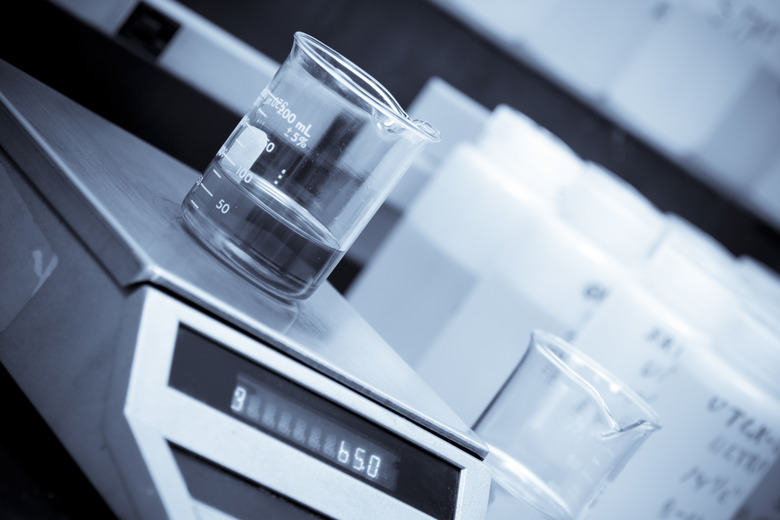How To Get Weight From Specific Gravity
If you know the specific gravity of a solid or liquid, you can easily calculate its density, and then its weight. Specific gravity equals the density of the solid or liquid divided by the density of water at a specific temperature. Once you know the density of that solid object or a specific liquid, you can calculate its mass per unit volume, and from that mass, you can get the weight. That's because density (D) is defined as being the ratio of mass (m) to volume (v), or:
\(D=\frac{m}{v}\)
Once you know the mass, you have to convert to weight only if you're using the imperial measurement system.
TL;DR (Too Long; Didn't Read)
Specific gravity is the density of a substance divided by the density of water. Once you know density, you know mass per unit volume, and from that you can determine the weight. In the imperial measurement system, you have to convert the mass in slugs to weight in pounds.
What Is Specific Gravity?
What Is Specific Gravity?
Scientists use the concept of specific gravity to compare the density of a substance to that of water. To calculate specific gravity, you divide the density of the substance by the density of water at 4 degrees Celsius, since water achieves its maximum density at this temperature. In CGS (centimeter, gram, second) metric units, the density of water is essentially 1 gram/cubic centimeter, so in these units, the density of an object is equal to its specific gravity. The only difference is that density has units of grams/cubic centimeter while specific gravity has no units. In other measurement systems, the density of water is not 1, so density and specific gravity are different numbers.
Units for Mass and Weight
Units for Mass and Weight
In the metric system, the units for mass and weight are the same: grams or kilograms. The imperial measurement system has different units for these quantities, though. This is because mass is a measure of the amount of matter an object contains while weight is a measure of the force of gravity on the object. In the imperial system, the unit for mass is the slug and the unit for weight is the newton. The pound is also a unit of weight. One pound equals 4.45 newtons.
Scientists tend not to distinguish between mass and weight on Earth, even though the imperial system preserves the distinction by using different units. In the imperial system, the units for density are slugs/cubic foot or slugs/cubic inch.
Calculating Mass From Specific Gravity
Calculating Mass From Specific Gravity
If you know the specific gravity for a solid or liquid, you can find the density by multiplying the specific gravity by the density of water at 4 degrees Celsius. In CGS units, the density of water is 1 g/cm3, so the density of the substance in question will equal the specific gravity. However, if you make the calculation in MKS (meters, kilograms, seconds) units, you'll be multiplying by 103, because the density of water in that system is 1,000 kg/m3. In the imperial system, multiply by 1.94 slug/ft3, which is the density of water in slugs.
Once you know density, you can calculate mass per unit volume. All you have to do is multiply that density by the volume of the solid or liquid to find the mass of the solid or liquid. In the metric system, the mass is equal to the weight, so no further conversion is necessary. If you've used the imperial system, though, you have to convert units from those slugs to pounds using the conversion 1 slug = 32.2 pounds.
Cite This Article
MLA
Deziel, Chris. "How To Get Weight From Specific Gravity" sciencing.com, https://www.sciencing.com/weight-specific-gravity-6495410/. 7 December 2020.
APA
Deziel, Chris. (2020, December 7). How To Get Weight From Specific Gravity. sciencing.com. Retrieved from https://www.sciencing.com/weight-specific-gravity-6495410/
Chicago
Deziel, Chris. How To Get Weight From Specific Gravity last modified March 24, 2022. https://www.sciencing.com/weight-specific-gravity-6495410/
